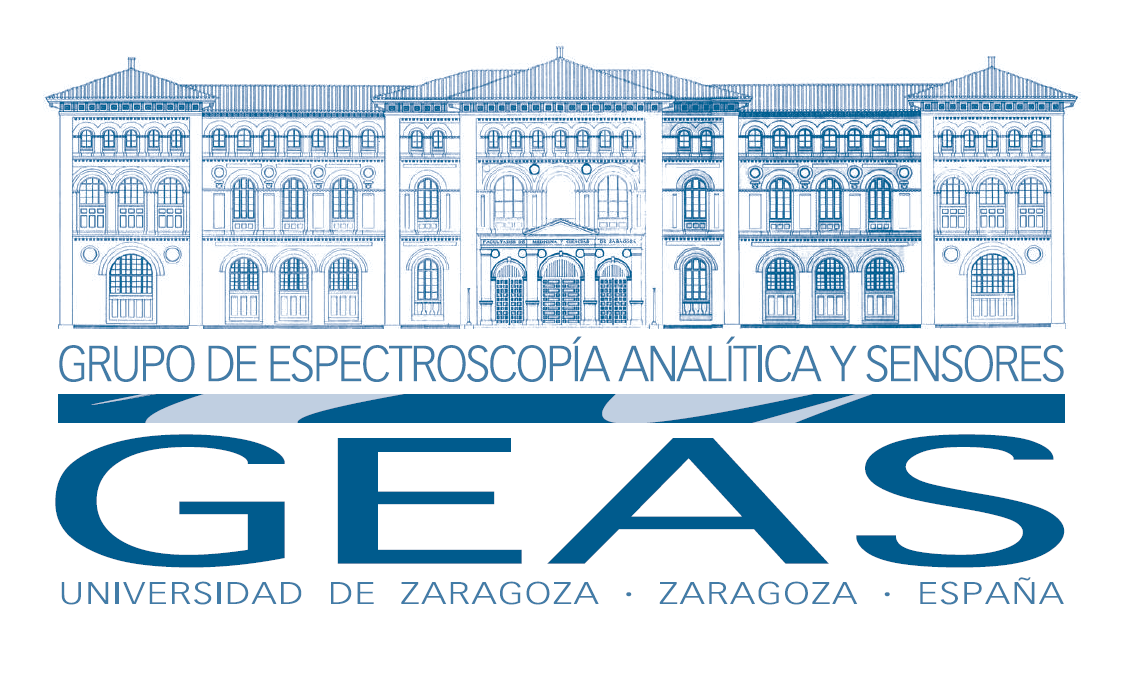
Analytical Spectroscopy and Sensors Group
The “Analytical Spectroscopy and Sensors” (GEAS) research group was established in 1982 by the Department of Analytical Chemistry of the University of Zaragoza.
It has been part of the Area of Chemical Science and Technology of the Institute of Research into Environmental Sciences of Aragon of the University of Zaragoza (IUCA) since its foundation in 2008.
Latest news from GEAS
Outreach activities: International Week of Women and Girls in Science and Science Immersion Week 2022
On the occasion of the celebration of the International Week of Women and Girls in Science, the GEAS group has participated with a series of...
Award for the best poster communication at the International Congress Colloquium Spectroscopicum Internationale XLII (CSI XLII 2022)
The researcher of the GEAS group Ms. Mariam Bakir Laso has won the award for the best communication in poster format at the International Congress...
Scientific article published in the journal Water
The Prof. Francisco Laborda, director of the GEAS group, has published a scientific article in the Water magazine related to the presence of...
Who we are
We are a Reference Research Group recognized by the Government of Aragon and the University of Zaragoza. The Group is the leading component of the NANOBACT Action Group of the Iberus International Campus of International Excellence formed by the Universities of La Rioja, Lleida, Pública de Navarra and Zaragoza.
The group was a pioneer in the characterization of nanomaterials and has lines of research in spectroscopy, electroanalytical techniques, electron microscopy and development of (bio)sensors.
Scientific production
Here you will find our scientific production.
The latest publications, meetings, invited conferences, and collaborations.
GEAS
Publications
Consult the publications of recent years (2015-2020)
GEAS
Meetings
Consult the meetings of recent years (2015 – 2020)
GEAS
Lectures Given
Consult the given lectures of recent years (2015 – 2020)
GEAS
Collaborations
Consult the collaborations of recent years (2015 – 2020)
GEAS, an international point of reference
The GEAS group began its coordinated research activities in 1983. The group sets an international benchmark in the field of analytical nanometrology, in the research and development of analytical (bio)sensors, and in archeometry and heritage analysis.
In the early 21st century it began a line of research in Analytical Nanometrology to develop techniques and methods of characterization and multielemental chemical and functional speciation of nanoparticles (both natural and artificial), macromolecules, and biocolloids.
The group sets an international benchmark in the characterization of nanomaterials in complex samples using analytical techniques based on AF4, SEC, ultracentrifugation, and hydrodynamic chromatography coupled with mass spectroscopy and electrochemical techniques (Particle Collission Coulometry, Voltammetry, Potentiometry, and Chronoamperometry), in addition to Raman Spectroscopy, X-Ray, TEM, … etc. techniques, and also Single Particle Analysis and Single Cell Analysis techniques.
In another line of research, since the early 1990s, the activity of GEAS has been focused on the designing and construction of electroanalytical and optical-spectroscopic sensors, proposing new biosensors based on biorecognition processes with enzymes, aptamers, and antibodies (immunosensors ).
We have developed conventional rapid response (bio)sensors and carbon screen-printed electrodes for clinical parameters, drugs of abuse, and species with toxicity (mycotoxins, viruses, etc.) in clinical applications, environment, food safety, and toxicological analysis .
In a third line of research the group studies the characterization of Heritage materials through archeometry procedures and the use of non-destructive instrumental techniques. These techniques allow a better understanding and preservation of the artistic and historical heritage, with special emphasis on the study of ceramics, pigments, and organic waste.
The GEAS group leads the NANOBACT Action Group of the Iberus International Campus of International Excellence, which is formed by the Universities of La Rioja, Lleida, Pública de Navarra, and Zaragoza
40 years of history
The GEAS Group, in its almost forty years of history, has given rise to other specialized analytical research groups. For example, “Nanosensors and Bioanalytical Systems”, “Chemistry and Environment”, “Rapid Analysis Methods with Spectroscopic Techniques” … etc. These groups are an international reference in some of their lines of research.




